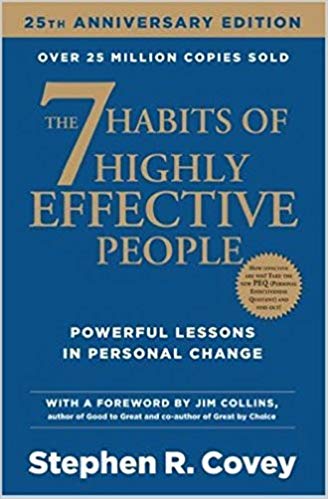

This article is an excerpt from the Shortform summary of "The 7 Habits of Highly Effective People" by Stephen Covey. Shortform has the world's best summaries of books you should be reading.
Like this article? Sign up for a free trial here .
What are the seven habits of Stephen Covey? How can adopting these habits help you become more effective in both life and work?
Stephen Covey’s habits are high-level, universal practices, and they encompass smaller habits that are more specific to each individual. The seven habits are designed to build from the foundation up—establishing a mindset, skills, and routines that help you identify and achieve the things that are most important to you.
Keep reading to learn how habits are formed and how you can make the most of Stephen Covey’s habits.
How to Make a Habit
How do you actually create habits? Stephen Covey asserts that they form at the intersection of knowledge, skill, and desire, all of which are necessary ingredients in a lasting habit.
- Knowledge: What do you need to do to achieve a result and why?
- Skill: How do you achieve that result?
- Desire: What’s your motivation to achieve it?
For example, imagine you want to improve your interactions with others because you tend to talk more than you listen, which often leads to misunderstandings and tension. To change your habit, you need to address all three aspects of it.
- First, you have to figure out what you’re doing (not listening) and understand why that’s creating the problem.
- Second, you have to learn how to become an active listener.
- Third, you have to truly want to make the effort to change.
| More How-Tos on Habit Formation Atomic Habits author James Clear explains that a habit consists of four stages that result in a reward, which creates a positive feedback loop. Here are the four stages, and how to engineer them to form a habit such as walking your dog each morning: Cue—This is the stimulus that signals to your brain that there’s an opportunity for reward. Make the cue obvious (put the dog’s leash near the coffee pot as a visual reminder). Craving—This is your desire for the reward, which creates your motivation for acting. Make the reward enticing to stimulate a craving (incorporate something you love into the walk, like listening to your favorite podcast). Response—This is the action that you do in response to the cue, which triggers the reward. Make the action easy (put your walking shoes by the door). Reward—This is the benefit or good feeling you gain from performing the action. Make the reward satisfying (take some quiet time to savor your coffee when you come home from your walk). If this sounds like the conditioning process that Ivan Pavlov discovered with his famous drooling dogs, that’s because it is. |
Habit 1: Be Proactive
Develop a proactive paradigm. In every situation, you have the choice of being reactive or proactive. If you’re reactive, you let your habits and conditioning dictate how you respond to the people and circumstances around you; if you’re proactive, you decide how you’ll respond to create the results you want. Being proactive requires you to take responsibility for your actions and their consequences, but it also empowers you to take hold of your life and make significant changes to your mindset and behavior.
Habit 2: Start With the End in Mind
Never losing sight of your long-term goals and values. To achieve the life you want, create a personal mission statement to identify the big picture—the life you want to lead, the character traits you want to embody, the impact you want to have on those around you. This document serves as a reminder of your ultimate goals and helps you ensure each short-term pursuit and daily action is in line with what’s most important to you.
Habit 3: Prioritize Important Over Urgent
Habit 3 zooms in to daily and weekly time management, so that you stay focused on your goals and values despite any demands and curveballs life throws at you. To effectively manage your time and improve your life, you must develop a keen sense of what’s truly important—what aligns with your personal mission statement—and prioritize time for those tasks, even when it means saying “no” to appealing but unimportant activities.
Habit 4: Think Win/Win
The 7 Habits all aim to help you reach interdependence, which allows you to reach your full potential by knowing how to work effectively with other people to achieve more than you could on your own. To that end, Habit 4 explains how to approach conflicts and negotiations with a Win/Win paradigm that aims to find a mutually beneficial solution, where everyone is happy with the decision and committed to the plan. People with the Win/Win frame of mind value cooperation over competition and believe that there is plenty — of money, success, happiness, and good fortune — to go around.
Habit 5: Listen and Understand the Other First
Habit 5 tackles how to have an effective interaction with someone: First work on understanding the other person’s perspective, and only then help her to understand your perspective. This approach requires empathic listening, where you’re listening with the intent to truly understand the other person’s perspectives and concerns. Only then can you determine the kind of mutually beneficial solution that a Win/Win paradigm strives to achieve.
Habit 6: Create Synergies
Habit 6 is the major achievement of independent relationships: the ability to create synergy with another person. Synergy means that two people working together can create greater results than would have been possible separately. When you have an understanding of your own paradigms and values, an appreciation of the other person’s perspective, and a genuine desire for Win/Win solutions, you can create synergy to achieve incredible, positive changes in your life that get you closer to reaching your personal mission.
Habit 7: Practice Self-Renewal to Keep Yourself Sharp
Habit 7 is the habit of self-renewal, which maintains and improves the quality of all the other habits. You’re the instrument of your life and performance, and taking care of yourself physically, spiritually, mentally, and socially/emotionally makes you most effective at creating positive change. Just like you have to do maintenance on your car to keep it running at peak capacity, you need to take care of yourself to continue functioning at your best. Self-renewal also improves how efficiently and effectively you’re able to practice the other habits, nurturing and strengthening your conscience, which helps you stay disciplined and focused on your personal growth through the 7 Habits.
How to Get the Most Out of the 7 Habits
As you learn about the seven habits, Covey suggests two paradigm shifts to help you reap the most benefits from them.
First, don’t read the book just once. The 7 Habits is meant to be a guide for readers to revisit and continually improve in each of the seven habits and all of them collectively. Just as basketball greats like Kobe Bryant perpetually refined their game by practicing fundamental skills, if you consistently work on each of the habits, your understanding and mastery of all seven will continually improve.
Second, read this book as if you’re going to teach it to someone else. Covey explains that this mindset encourages you to seek a more thorough understanding of the importance and implementation of the seven habits than if you were passively absorbing the information as a mere student.
———End of Preview———

Like what you just read? Read the rest of the world's best summary of "The 7 Habits of Highly Effective People" at Shortform . Learn the book's critical concepts in 20 minutes or less .
Here's what you'll find in our full The 7 Habits of Highly Effective People summary :
- How to prioritize the hundred tasks you have to focus on the one or two that really matter
- The right way to resolve every disagreement and argument
- How to avoid burning out and succeed over 20+ years






